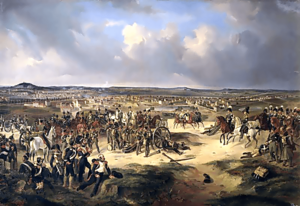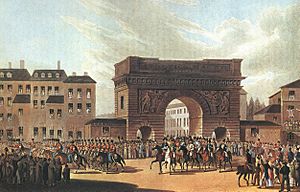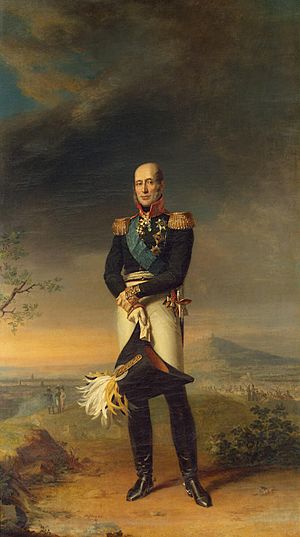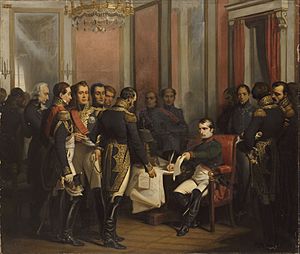Battle of Paris (1814) facts for kids
Quick facts for kids Battle of Paris |
|||||||||
|---|---|---|---|---|---|---|---|---|---|
| Part of the Campaign of France of the Sixth Coalition | |||||||||
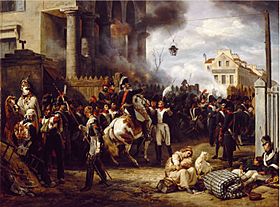 The Defense of Clichy during the battle |
|||||||||
|
|||||||||
| Belligerents | |||||||||
| Commanders and leaders | |||||||||
| Strength | |||||||||
| 29,000-42,000 | Russia: 100,000 Austria: 15,000 Prussia: 40,000 Total: 100,000-155,000 |
||||||||
| Casualties and losses | |||||||||
| 5,000-9,300 killed, wounded or captured | 9,000-18,000 killed, wounded or captured | ||||||||
The Battle of Paris was a major fight that happened on March 30–31, 1814. It was fought between the Sixth Coalition (an alliance of countries like Russia, Austria, and Prussia) and the French Empire. After a day of intense fighting in the areas around Paris, the French army gave up. This battle marked the end of the War of the Sixth Coalition. It also led to Emperor Napoleon having to give up his power and go into exile.
Contents
The Battle of Paris (1814)
What Led to the Battle?
Napoleon's Retreat and the Coalition
Napoleon's army had suffered a huge defeat in Russia in 1812. As the Russian armies pushed forward, many countries joined together to form the Sixth Coalition. This group included Russia, Austria, Prussia, Great Britain, and others who were against Napoleon's French Empire.
Even though Napoleon won some early battles in Germany, the Coalition armies eventually teamed up. They defeated him badly at the Battle of Leipzig in late 1813. After this loss, Napoleon's control over Germany weakened. The Coalition forces then crossed the Rhine River and invaded France.
France Gets Tired of War
By this time, the people of France were very tired of war. France had been fighting for 25 years, and many men had died. Forcing young men to join the army (called conscription) was very unpopular.
When the Coalition armies entered France, they were surprised. The French people did not rise up against them, like the people in Spain or Russia had done against Napoleon. Even Napoleon's former foreign minister, Talleyrand, told the Coalition leaders that Parisians were angry with Napoleon. He said they would even welcome the Coalition armies into the city.
A Clever Plan to Trick Napoleon
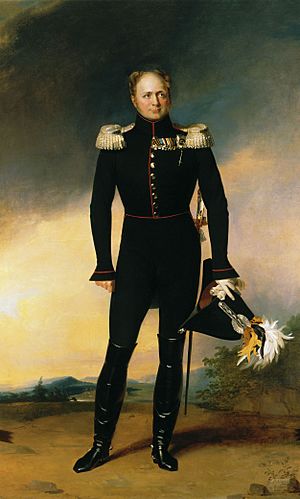
The Coalition leaders decided that capturing Paris was more important than directly fighting Napoleon. A Russian general named Toll suggested a plan. He said they should attack Paris directly with their main army. At the same time, they would send a small group to trick Napoleon into going far away from the city.
Tsar Alexander I of Russia liked this idea. He met with the Prussian king and General Schwarzenberg. They agreed to stop chasing Napoleon's army. Instead, their main army would march straight to Paris. A small cavalry group of 10,000 soldiers would follow Napoleon. Their job was to make Napoleon think the whole Coalition army was still chasing him.
This trick worked perfectly. While the main Coalition army headed for Paris, the small group chased Napoleon's army far to the southeast. By the time Napoleon realized he had been tricked, it was too late. He was too far away to help defend Paris.
Who Fought in the Battle?
The armies of Austria, Prussia, and Russia joined forces. They were led by Field Marshal Count Barclay de Tolly. However, the real leaders guiding the army were Tsar Alexander I of Russia and the King of Prussia.
The Coalition army had about 150,000 soldiers. Most of them were experienced fighters. Napoleon had left his brother, Joseph Bonaparte, in charge of defending Paris. Joseph had about 23,000 regular soldiers, many of whom were young recruits. He also had 6,000 National Guard members and a small group of the Imperial Guard. The French also had some trenches and defenses around the city, but they were not fully ready.
The Battle Begins
The Coalition army arrived outside Paris in late March. On March 29, they set up camp. Their plan was to attack the city from the north and east on the morning of March 30.
The battle began early on March 30 with heavy cannon fire from the Coalition side. Russian troops attacked first, pushing back French fighters near Belleville. But then French cavalry pushed them back. By 7:00 a.m., the Russians attacked the Young Guard in the center of the French lines. After tough fighting, they forced the French to retreat.
A few hours later, the Prussians, led by Blücher, attacked north of the city. They captured the French positions around Aubervilliers. Meanwhile, troops from Württemberg took positions to the southeast, supported by Austrian soldiers.
The Russians tried to push forward again in the center. But they got stuck in trenches and faced heavy artillery fire. They had to fall back when the French Imperial Guard counter-attacked. The Imperial Guard bravely held back the Russians until Prussian forces appeared behind them.
The Russian Imperial Guard and the Prussian Life Guards then attacked the Montmartre Heights in the northeast of the city. This area was very important because Joseph Bonaparte's headquarters had been there. The fighting for these heights was very fierce. The Prussian guards suffered many losses, but they eventually took control of the heights. Joseph Bonaparte fled the city.
Marshal Marmont, one of the French commanders, secretly made a deal with the Coalition. Soon after, he led his soldiers to a place where Coalition troops quickly surrounded them. Marmont then surrendered, as he had agreed to do.
What Happened After the Battle?
After the surrender, Tsar Alexander sent someone to meet with the French to finalize it. He offered fair terms to the French. Even though he could have sought revenge for the burning of Moscow a year earlier, he said he was bringing peace to France.
On March 31, Talleyrand gave the city's key to the Tsar. Later that day, the Coalition armies proudly marched into Paris. The Tsar led the army, followed by the King of Prussia and Prince Schwarzenberg. On April 2, the French Senate officially removed Napoleon from power.
Napoleon was on his way to Paris when he heard the city had surrendered. He was very angry and wanted to march on the capital. But his generals refused to fight for him and urged him to give up. On April 4, he tried to give up his power to his son. However, the Allies refused this offer. They forced Napoleon to give up his power completely on April 6.
The terms of his surrender included sending him away to the Isle of Elba. This was agreed upon in the Treaty of Fontainebleau on April 11, 1814. Napoleon reluctantly signed it two days later.
The War of the Sixth Coalition was over. However, Napoleon would later escape Elba and return to power for a short time, known as the Hundred Days, which began on March 20, 1815.
See Also
- Military career of Napoleon Bonaparte
- Parizh, a village named after this battle.
- Medal "For the Capture of Paris", a Russian medal for those who fought in the battle.
 | Roy Wilkins |
 | John Lewis |
 | Linda Carol Brown |


